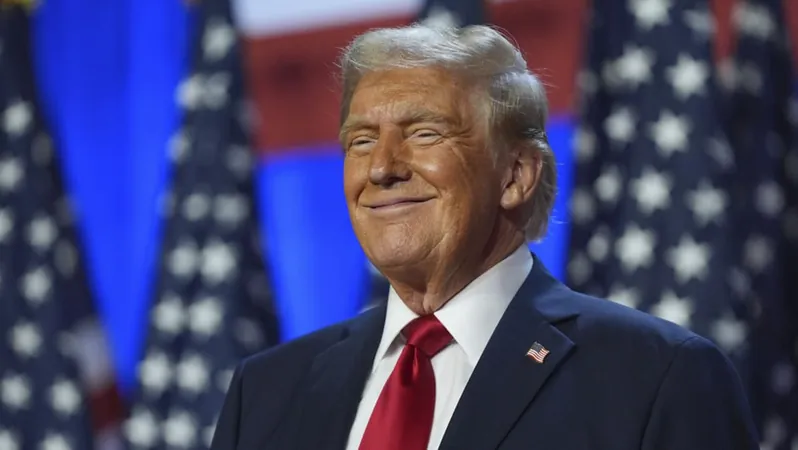
What Lies Ahead for Singapore with Trump Back in the White House? Experts Share Insights
2024-11-07
Author: Daniel
What Lies Ahead for Singapore with Trump Back in the White House? Experts Share Insights
As Donald Trump gears up for his second presidential term, experts suggest that Singapore and other nations must prepare for a significant shift in U.S. foreign policy. This insight will be crucial as Trump, known for his unpredictable leadership style, prepares to take the oath of office again this January.
Dr. Adrian Ang, a US Programme coordinator at the S. Rajaratnam School of International Studies (RSIS), notes that the international community has a unique advantage: “Having navigated Trump's first term, we have a clearer understanding of how to engage with him moving forward.” Trump’s age of 78 does not lessen the volatility his leadership brings to global affairs.
Analysts have characterized Trump as a "transactional leader," implying that alliances with the U.S. could come at a higher cost. Kevin Chen, an associate research fellow at RSIS, warns that Singapore may find itself needing to make more substantial contributions to defense and security partnerships if it wishes to maintain strong ties. During his first term, Trump insisted that U.S. allies like South Korea and NATO countries provide more financial support for defense expenses, and this pattern is likely to continue.
Chen further advises that Singapore's approach should focus on personal relationships. “High-level face-to-face meetings are crucial. To ensure they are taken seriously, it may require direct engagement from our prime minister,” he emphasizes.
Lessons from Trump's First Term: A Cautionary Tale
Trump's initial presidency was marked by drastic policy shifts, including the abrupt withdrawal from the Trans-Pacific Partnership (TPP), a move that shocked many nations including Singapore. While Singapore and other countries eventually adapted by pursuing new trade agreements, Dr. Ang cautions against a repeat of such disruptive actions and encourages leveraging relationships with like-minded countries to sustain the multilateral trade system.
The political landscape has transformed since Trump last held office, with a rising tide of protectionism sweeping the globe. “Although Singapore thrives on global openness, the reality is that we may face a less hospitable international environment,” warns Assoc. Prof. Chong Ja Ian from the National University of Singapore.
Interestingly, experts anticipate fewer shocks in the transition from President Biden to Trump this time around. Dr. Ang highlights that many of Biden’s policies continued the trajectory set by Trump, particularly in the Indo-Pacific region.
US-China Tensions and Their Implications for Singapore
Trump's re-election could signify tougher trade stances, particularly in relation to China. With expected stringent regulations surfacing over technology transfers and semiconductors, Southeast Asian nations—including Singapore—may find opportunities to diversify their supply chains away from China. However, there’s a flip side; companies and countries with meaningful ties to China could face scrutiny and potential sanctions.
“While this opens doors for some, it also presents risks,” Dr. Ang notes. Chen adds that tariffs imposed by Trump could hit the region hard, but they might also serve as bargaining tools in diplomatic negotiations with other countries.
Security Dynamics Forecast: A Growing Challenge
The geopolitical landscape surrounding the South China Sea and the Taiwan Strait is predicted to become increasingly tense under Trump's leadership. Chen foresees hawkish national security appointments, potentially exacerbating regional security challenges. “We must remain vigilant as these developments unfold,” he cautions.
The strategic calculus for Singapore remains centered on ensuring U.S. involvement in regional stability. However, Singapore's leaders must tread carefully amid rising US-China competition as they navigate this intricate diplomatic web.
Prof. Chong encapsulates the complexities of the situation, stating that although Southeast Asian nations have yet to face a binary choice between the U.S. and China, proactive planning for potential future conflicts is essential.
As analysts ponder the implications of a second Trump presidency for Singapore, one thing is clear: the stakes are high, and the path ahead is fraught with uncertainty yet ripe with opportunity for those who can adeptly navigate the changing tides of global politics.





 Brasil (PT)
Brasil (PT)
 Canada (EN)
Canada (EN)
 Chile (ES)
Chile (ES)
 España (ES)
España (ES)
 France (FR)
France (FR)
 Hong Kong (EN)
Hong Kong (EN)
 Italia (IT)
Italia (IT)
 日本 (JA)
日本 (JA)
 Magyarország (HU)
Magyarország (HU)
 Norge (NO)
Norge (NO)
 Polska (PL)
Polska (PL)
 Schweiz (DE)
Schweiz (DE)
 Singapore (EN)
Singapore (EN)
 Sverige (SV)
Sverige (SV)
 Suomi (FI)
Suomi (FI)
 Türkiye (TR)
Türkiye (TR)